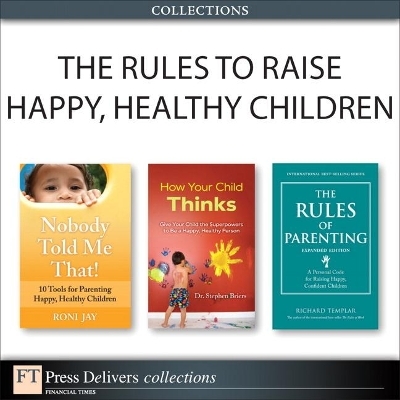
The Rules to Raise Happy, Healthy Children (Collection)
Addison Wesley
978-0-13-344586-2 (ISBN)
- Titel ist leider vergriffen;
keine Neuauflage - Artikel merken
3 great books help you become a better, happier parent… and raise happier, less stressed, more successful children!
When it comes to parenting, nobody’s perfect, nobody can do it all, and nobody can guarantee results. Not you. Not anyone. So, how do you do the things you can do? The things most likely to help your children enjoy their lives, and grow into healthy, confident, successful, happy adults? These three books bring together invaluable advice: help that’s fun, friendly, non-judgmental, realistic, and above all, useful! Richard Templar’s The Rules of Parenting, Expanded Edition serves up 100+ flexible tips and adaptable “Rules” for your family, starting with the most important Rule of them all: RELAX. Here’s all you need to know from toddler to first boyfriend/girlfriend, driving lessons through college and beyond… help with attitude, discipline, siblings, school, teenage life, crises, “grown” children… and above all, staying sane! Next, in Nobody Told Me That!, Roni Jay offers great advice for raising kids who are more confident, resilient, ethical, loving, competent, responsible, fulfilled, engaged, and enthusiastic. Jay identifies what the most successful parents do, distills those insights into 10 core principles, and shows how to actually apply them in your own family. Finally, in How Your Child Thinks, world-renowned child psychologist Dr. Stephen Briers goes inside your child’s mind, and helps you give them the skills, tactics, and strategies they’ll need to manage their own lives. Briers teaches powerful, proactive techniques that don’t simply respond to bad behavior, but keep it from happening in the first place. Drawing on compelling new research on positive psychology, he shows how to cultivate specific habits of thought that nurture resilience and help “inoculate” against depressive illness… promote happiness and well-being… cultivate personal competence and social confidence… boost problem-solving skills, and more. With these eBooks, you and your kids will enjoy each other more… and they’ll grow up with the solid foundation they need to find their own paths, build their own lives, and thrive!
From world-renowned family happiness experts Richard Templar, Roni Jay, and Stephen Briers
Richard Templar, an astute observer of human behavior, understands what makes the difference between those of us who effortlessly glide towards success and those of us who struggle against the tide. He has distilled these observations into his Rules titles. More than one million people around the world have enjoyed and now play by his Rules. Roni Jay is widely admired as an instinctive parent who handles tricky child issues with wisdom and inspired thinking. As an author and publisher specializing in parenting books she has been responsible for popular and acclaimed titles such as Babies for Beginners and Pregnancy for Beginners. Roni is the mother of three children and step-mum to another three. Dr. Stephen Briers is a clinical psychologist, working with children and families. He is a presenter on the BBC parenting series Little Angels and Teen Tearaways to Teen Angels.
The Rules of Parenting: A Personal Code for Raising Happy, Confident Children, Expanded Edition
Contents
Introduction xi
Part I Rules for Staying Sane 2
1 Relax 4
2 No One Is Perfect 6
3 Be Content 8
4 Know What You’re Good at 10
5 Almost Any Rule Can Be Broken Occasionally 12
6 Don’t Try to Do Everything 14
7 You Don’t Have to Follow Every Piece of Advice You Get (Including This One) 16
8 It’s Normal to Want to Escape 18
9 You’re Allowed to Hide from Your Kids 20
10 Parents Are People Too 22
11 Don’t Ignore Your Relationship with Your Partner 24
Part II Attitude Rules 26
12 Love Is Not Enough 28
13 Every Recipe Needs Different Ingredients 30
14 Anything Extreme Is Almost Certainly Wrong 32
15 Look Pleased to See Them 34
16 Treat Your Child with Respect 36
17 Enjoy Their Company 38
18 It’s Not about You – It’s about Them 40
19 Being Tidy Isn’t as Important as You Think 42
20 Good Parenting Is Calculated Risk Taking 44
21 Keep Your Worries to Yourself 46
22 See Things from Their Point of View 48
23 Parenting Is Not a Competitive Sport 50
24 Never Emotionally Blackmail Them 52
Part III Everyday Rules 54
25 Let Them Get On with It 56
26 Let Them Go (Wild) 58
27 Teach Them to Think for Themselves 60
28 Use Praise Wisely 62
29 Make Sure They Know What’s Important 64
30 Show Them How to Lose 66
31 Know the Value of Boundaries 68
32 Bribery Doesn’t Have to Be Bad 70
33 Moods Are Catching 72
34 You’re Setting Their Eating Patterns for Life 74
35 Communicate 76
36 Set Clear Targets 78
37 Don’t Be a Nag 80
Part IV Discipline Rules 82
38 Present a United Front 84
39 Carrots Beat Sticks 86
40 Be Consistent 88
41 Lighten Up 90
42 Focus on the Problem, Not the Person 92
43 Don’t Paint Yourself into a Corner 94
44 If You Lose Your Temper, You’re the Loser 96
45 Apologize if You Get It Wrong 98
46 Let Them Back in 100
47 The Right of Expression 102
Part V Personality Rules 104
48 Find What Incentives Work for Your Child 106
49 Every Child Should Have Something He Knows He’s Good At 108
50 Learn to Appreciate the Qualities That Remind You of Someone Else 110
51 Look for the Similarities Between You 112
52 Find Qualities to Admire in Them 114
53 Let Them Be Better Than You 116
54 Their Attitude Is as Important as Their Achievements 118
55 Keep Your Fears and Insecurities to Yourself 120
56 Mind Your Programming 122
57 Don’t Try to Have a Perfect Child 124
Part VI Sibling Rules 126
58 Give Them Each Other 128
59 Recognize that Squabbling Is Healthy (Within Reason) 130
60 Teach Them to Fight Their Own Battles 132
61 Work as a Team 134
62 Let Them Entertain Each Other 136
63 Never Compare Children with Each Other 138
64 Different Children Need Different Rules 140
65 Don’t Have a Favorite 142
66 Mix and Match 144
67 Find Each Child’s Strengths 146
Part VII School Rules 148
68 Schooling Isn’t the Same as Education 150
69 School Comes as a Package 152
70 Fight Your Child’s Corner 154
71 Bullying Is Always Serious 156
72 Teach Them to Stand Up for Themselves 158
73 Put Up with Friends of Theirs You Don’t Like 160
74 Remember You’re Their Parent, Not Their Teacher 162
75 Don’t Spoil Them 164
76 Let Up the Pressure 166
77 They Have to Live with Their Choices (and It’s OK) 168
Part VIII Teenage Rules 170
78 Don’t Panic 172
79 Remember Newton’s Third Law 174
80 Give Them a Voice 176
81 Don’t Look Under the Mattress 178
82 Running Around after Them Doesn’t Help Anybody 180
83 Don’t Stand in Front of a Speeding Train 182
84 Yelling Isn’t the Answer 184
85 Let Them Have the Last Word 186
86 Everything Comes with Strings 188
87 Show Some Respect for the Things They Care about 190
88 Adopt a Healthy Attitude to Sex 192
Part IX Crisis Rules 194
89 Don’t Use Your Kids as Ammunition 196
90 Let Them Cope in Their Own Way 198
91 Being Younger Doesn’t Necessarily Speed Everything Up 200
92 The Aftershock Can Last Forever 202
93 Tell Them What’s Going On 204
94 Teach Them to Fail Successfully 206
95 It’s Better to Agree Than to Be Right 208
96 All of Your Actions Speak Louder Than Any of Your Words 210
97 Make Sure They Know They’re Priority No. 1 212
98 You Can’t Fix Everything 214
Part X Grown-up Rules 216
99 Back Off 218
100 Wait Until They Ask for Advice 220
101 Treat Them as Adults 222
102 Don’t Try to Be Their Best Friend 224
103 Encourage Them Regardless 226
104 You Can’t Choose Who Your Children Love 228
105 Leave the Strings Off 230
106 Don’t Guilt-Trip Them 232
107 Remember They Still Need You 234
108 It’s Not Your Fault 236
109 Once a Parent, Always a Parent 238
Nobody Told Me That!: 10 Tools for Parenting Happy, Healthy Children
About the Author xii
Introduction xiii
Tool 1: Make Their World Solid 1
Tool 2: Give Them Some Magic 23
Tool 3: Show Them How to Separate Right from Wrong 37
Tool 4: Teach Them to Think 49
Tool 5: Let Them Lead You 67
Tool 6: Forget Quality Time 83
Tool 7: Make Sure You See the Forest and the Trees 97
Tool 8: Teach Them the Value of Money 117
Tool 9: Show Them That Broccoli Can Be Fun 135
Tool 10: Give Them Each Other 159
Index 179
How Your Child Thinks: Give Your Child the Superpowers to Be a Happy, Healthy Person
About the Author xiv
Introduction 1
Chapter 1 X-ray Vision: What’s Going on Inside? 17
Chapter 2 Developing Super-Senses: The ABC of Feelings 31
Chapter 3 Mind Control for Beginners: The Foundations of Self-Control 67
Chapter 4 Becoming Indestructible: Nurturing Resilience in Young People 99
Chapter 5 Wrestling with Monsters: Overcoming Stress and Anxiety 125
Chapter 6 People Powers: Cultivating Social Confidence 173
Chapter 7 Unstoppable: Boosting Your Child’s Problem-Solving Skills 207
References 237
Index 245
| Erscheint lt. Verlag | 26.4.2013 |
|---|---|
| Verlagsort | Boston |
| Sprache | englisch |
| Gewicht | 1 g |
| Themenwelt | Sachbuch/Ratgeber ► Gesundheit / Leben / Psychologie ► Familie / Erziehung |
| ISBN-10 | 0-13-344586-0 / 0133445860 |
| ISBN-13 | 978-0-13-344586-2 / 9780133445862 |
| Zustand | Neuware |
| Haben Sie eine Frage zum Produkt? |
aus dem Bereich


